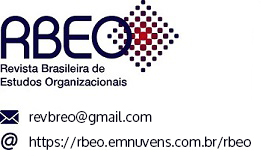METASSÍNTESE EM ESTUDOS DE CASO SOBRE CONHECIMENTO E EXPANSÃO DE FRONTEIRAS ORGANIZACIONAIS
DOI:
https://doi.org/10.21583/2447-4851.rbeo.2022.v9n1.460Palavras-chave:
metassíntese, conhecimento, fronteiras organizacionais, organizing, estrutura de significados.Resumo
Esta pesquisa tem por objetivo compreender a relação do conhecimento na expansão das fronteiras organizacionais. Para isso utilizou-se uma metassíntese cuja primeira busca resultou em 22 trabalhos que depois de classificados e codificados resultaram em 4 estudos de caso que serviram de base à pesquisa. Identificou-se que a relação entre conhecimento e fronteiras intangíveis relacionadas à cognição dos atores chave nas organizações exerce importante influência nos processos de expansão de fronteiras organizacionais. Entretanto esta pesquisa vai além demonstrando que os estudos organizacionais precisam entender e explorar a natureza processual do compartilhamento de conhecimento e expansão de fronteiras organizacionais como resultado intrínseco do organizing no contínuo processo de becoming organizacional.Downloads
Referências
AKKERMAN, S.; BAKKER, A. Boundary crossing and boundary objects. Review of Educational Research. v. 81, n. 2, p. 132-169, 2011.
ASHFORTH, B. E.; KREINER, G. E.; FUGATE, M. Allinaday’s work: boundaries and micro role transitions. Academy of Management Review, v. 25, p. 472–491, 2000.
BOSUA. R.; VENKITACHALAM, K. Fostering knowledge transfer and learning in shift work environments. Knowledge and Process Management, v. 22, n. 1, p. 22-33, 2015.
BURT, R. S. The Contingent Value of Social Capital. Administrative Science Quarterly, v. 42, n. 2, p. 339-365, 1997.
CHIA, R. From modern to postmodern organizational analysis. Organization Studies, v. 16, n. 4, p. 579-604, 1995.
CZARNIAWSKA, B. On time, space, and action nets. Organization, v. 11, n. 6, p. 773-791, 2004.
COOB JR., J. B. A glossary with alphabetical index to technical terms in Process and Reality: Whitehead word book. Claremont, CA, P&F Press, 2008.
COOPER, R. (1976). The open field. Human Relations, v. 29, n. 11, p. 999-1017.
COOPER, R.; LAW, J. Organization: distal and proximal views. Research in the Sociology of Organizations, v. 13, p. 237-7, 1995.
DRORI, I.; WRZESNIEWSKI, A.; ELLIS, S. One out of many? Boundary negotiation and identity formation in postmerger integration. Organization Science, v. 24, n. 6, p. 1717-1741, 2013.
FARJOUN, M.; ANSELLL, C; BOIN, A. Pragmatism in organization studies: meeting the challenges of a dynamic and complex world. Organization Science, v. 26, n. 6, p. 1787-1804., 2015.
GASSON, S. The Dynamics of Sensemaking, Knowledge, and Expertise in Collaborative, Boundary-Spanning Design. Journal of Computer-Mediated Communication, v. 10, 2017.
HAKANSON, L.; CAESSENS, P.; MACAULAY, S.. InnovationXchange: a case study in innovation intermediation. Innovation: Management, policy & practice, v. 13, n. 2, p. 261-274, 2011.
HARA, N.; FICHMAN, P. Frameworks for understanding knowledge sharing in open online communities: boundaries and boundary crossing. In: P. Fichman and H. Rosemnbaum, Social informatics: past, present and future. Cambridge Scholars Publishing, Cambridge, MA, 2014.
HERNES, T. Studying composite boundaries: a framework of analysis. Human Relations, v. 57, n. 1, p. 9-29, 2004.
HERNES, T. Understanding organization as process: theory for a tangled world. London: Routledge, 2008.
HERNES, T. A process theory of organization. United Kingdom: Oxford University Press, 2014.
HOON, C. Meta-synthesis of qualitative case studies: an approach to the building. Organizational Research Methods, v. 16, n. 4, p. 522-556, 2014.
LANGLEY, A.; SMALLMAN, C.; TSOUKAS, H.; VAN DE VEN, A. H. Process studies of change in organization and management: unveiling temporality, activity and flow. Academy of Management Journal, v. 56, n. 1, p. 1-13, 2013.
LANGLEY, A., & TSOUKAS, S. Introduction: process thinking, process theorizing and process researching. In: A. Langley., H. Tsoukas, (Ed.). The SAGE Handbook of Process Organization Studies. London: SAGE Publications Ltd, p. 1-25, 2017.
LEIFER, R.; DELBECQ, A. Organizational/Environmental Interchange: A Model of Boundary Spanning Activity. Academy of Management Review, v. 3, n. 1, p. 40-50, 1978
LOPEZ-VEJA, H.; TELL, F.; VANHAVERBEKE, W. Where and how to search? Search paths in open innovation. Research Policy, 2015.
MARIANO, S.; AWAZU, Y. The role of collaborative knowledge building in the co-creation of artifacts: influencing factors and propositions. Journal of Knowledge Management, v. 21, p.779-795, 2017.
MASS, J.; FENEMA, V.; SOETERS. J. ERP as an organizational innovation: key users and cross-boundary knowledge management. Journal of Knowledge Management. v. 20, p. 557-577, 2016.
NOSEK, J. T. Group cognition as a basis for supporting group knowledge creation and sharing. Journal of Knowledge Management. v. 8, n. 4, p. 54-64, 2004.
PAWLOWSKI, S. D.; ROBEY, D. Bridging user organizations: knowledge brokering and the work of information technology professionals”, MIS Quarterly, v. 28, n. 4, p. 645-672, 2004.
STURDY, A.; CLARK, T.; FINCHAM, R.; HANDLEY, K. Between innovation and legitimation – boundaries and knowledge flow in management consultancy. Organization, v. 16, n. 5, p. 627-653, 2009.
TSOUKAS, H., & CHIA, R. An organizational becoming: rethinking organizational change. Organization Science, v. 13, n. 5, p. 567-582. https://doi.org/10.1287/orsc.13.5.567.7810, 2002.
WEICK, K. E. Sensemaking in organizations. Sage Publications: London, 1995.
WEICK, K. E. The social psychology of organizing. 2nd ed. New York: Random, 1979.
Downloads
Arquivos adicionais
Publicado
Como Citar
Edição
Seção
Licença
Autores que publicam nesta revista concordam com os seguintes termos:- Autores mantém os direitos autorais e concedem à revista o direito de primeira publicação, com o trabalho simultaneamente licenciado sob a Licença Creative Commons Attribution que permite o compartilhamento do trabalho com reconhecimento da autoria e publicação inicial nesta revista.



